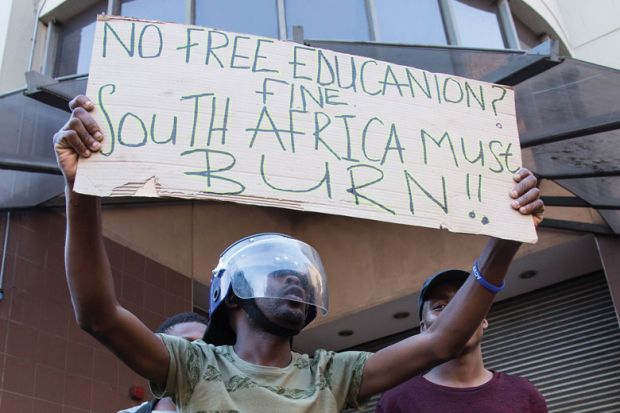University and student leaders in South Africa have warned that campuses may be hit with student protests again next year as institutions make difficult financial decisions to cope with the pandemic.
Covid-19 has had an impact on the finances of universities across the world, but institutions in South Africa are facing particularly acute challenges as a result of the country’s high level of income inequality and long-running and heated debates over tuition fees.
While South African universities have so far been able to set their own tuition fee levels, last month higher education minister Blade Nzimande proposed inflation-linked caps on tuition and accommodation fee increases for the 2021 academic year, which is set to begin between March and April, a month later than usual. These amount to a maximum increase of 4.7 per cent in tuition fees and 6.7 per cent in accommodation fees.
Ahmed Bawa, chief executive of Universities South Africa, which represents the sector’s 26 public institutions, said that all its members had entered into an informal compact with the government to stick to the proposed fee caps.
“This, together with the fact that there has been a cut in subsidies in 2020-21 and a projected larger cut in 2021-22, places the universities on the cusp of serious financial stress in the context of the huge repurposing of budgets to address the challenges posed by the pandemic,” he said.
“From the government’s point of view, any increase in tuition fees beyond CPI [consumer price index] will place the new bursary system for poor and working-class families at risk, taking into account the fiscal constraints the state faces.”
Under a policy introduced by former president Jacob Zuma, students from poorer households are eligible for free tuition and financial support.
Professor Bawa added that whether there will be student demonstrations at the beginning of next year will depend on whether this bursary system “works well”.
The Department of Higher Education and Training is planning to formally regulate fee levels to make institutions more affordable, and the framework for this was due to be completed this year, but it was delayed by the pandemic.
Adam Habib, outgoing vice-chancellor of the University of the Witwatersrand (Wits), confirmed that the institution would be “sticking with the government recommendation of a 4.7 per cent tuition increase and a 6.7 per cent increase in residence fees”.
He said he was concerned that the economic crisis was “likely to feed into the universities both through cuts in subsidy and difficulty in paying fees”, given that the government has collected R300 billion [£15 billion) less in tax receipts than last year and that unemployment has risen.
“Given these fiscal challenges, trade-offs will be necessary and this may manifest in student protests. It is a worry,” he said.
Student leaders have already indicated that they may fight against the rises – although the shift to online learning has so far restricted their ability to hold demonstrations.
Mpendulo Mfeka, president of Wits’ student representative council (SRC), said he was pushing for a fee freeze, claiming that the delayed start to the academic year and the use of online learning meant that institutions should be saving on some costs.
“At this point in time we are finding it difficult to respond – and by respond I mean to take it to protest. The reason is…that over half of the student populace has not returned to university residences,” he said. He added that there would “definitely” be demonstrations next year focused on free education.
Register to continue
Why register?
- Registration is free and only takes a moment
- Once registered, you can read 3 articles a month
- Sign up for our newsletter
Subscribe
Or subscribe for unlimited access to:
- Unlimited access to news, views, insights & reviews
- Digital editions
- Digital access to THE’s university and college rankings analysis
Already registered or a current subscriber? Login








